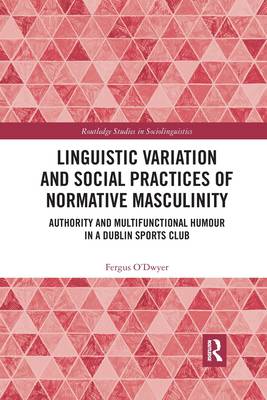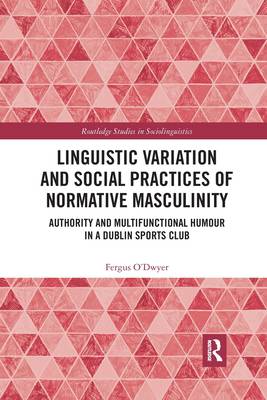
- Retrait gratuit dans votre magasin Club
- 7.000.000 titres dans notre catalogue
- Payer en toute sécurité
- Toujours un magasin près de chez vous
- Retrait gratuit dans votre magasin Club
- 7.000.000 titres dans notre catalogue
- Payer en toute sécurité
- Toujours un magasin près de chez vous
Linguistic Variation and Social Practices of Normative Masculinity
Authority and Multifunctional Humour in a Dublin Sports Club
Fergus O'DwyerDescription
This book explores the ways in which linguistic variation and complex social practices interact toward the formation of male interactional identities in a sports club in Dublin, illustrating the affordances of studying sporting contexts in contributing to advancing sociolinguistic theory.
Adopting a participant-informed ethnographic approach, the book examines both the social interactional contexts within the club and the sociopragmatic and sociophonetic features which contribute to the different performances of masculinity in and outside the club. The volume focuses particularly on the linguistic analysis of humor and its multifunctional uses as a means of establishing solidarity and social ties but also aggression, competitiveness, and status within the social world of this club as well as similar such clubs across Ireland. The book's unique approach is intended to complement and build on existing sociolinguistic studies looking at linguistic variation in groups by supporting quantitative data with ethnographically informed insights to look at social meaning in interaction from micro-, meso-, and macro-levels.
This book will be of particular interesting to graduate students and scholars in sociolinguistics, language, gender, and sexuality, and language and identity.
Spécifications
Parties prenantes
- Auteur(s) :
- Editeur:
Contenu
- Nombre de pages :
- 260
- Langue:
- Anglais
- Collection :
Caractéristiques
- EAN:
- 9781032336817
- Date de parution :
- 13-06-22
- Format:
- Livre broché
- Format numérique:
- Trade paperback (VS)
- Dimensions :
- 150 mm x 226 mm
- Poids :
- 362 g







